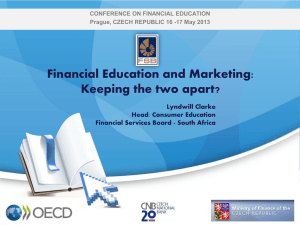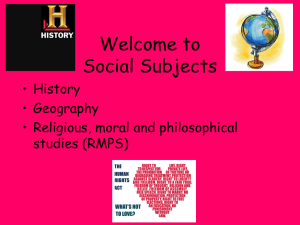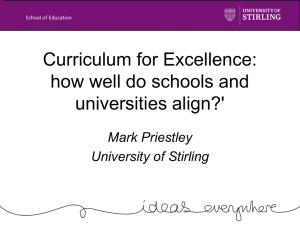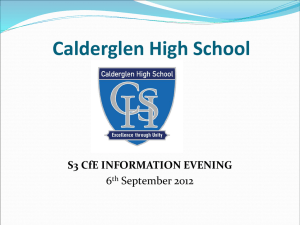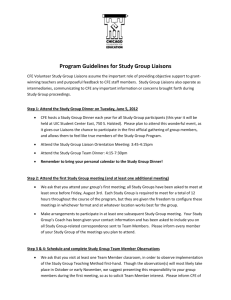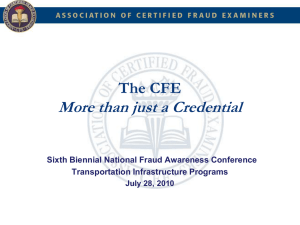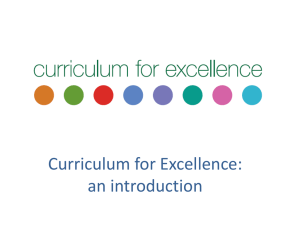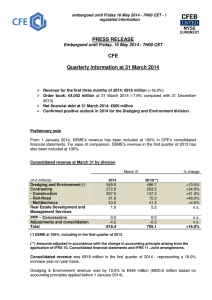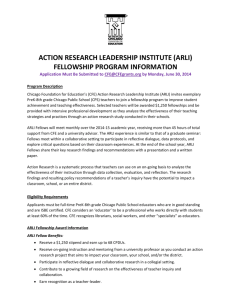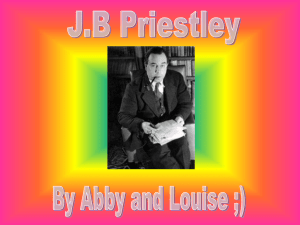- the Enhancement Themes website
advertisement
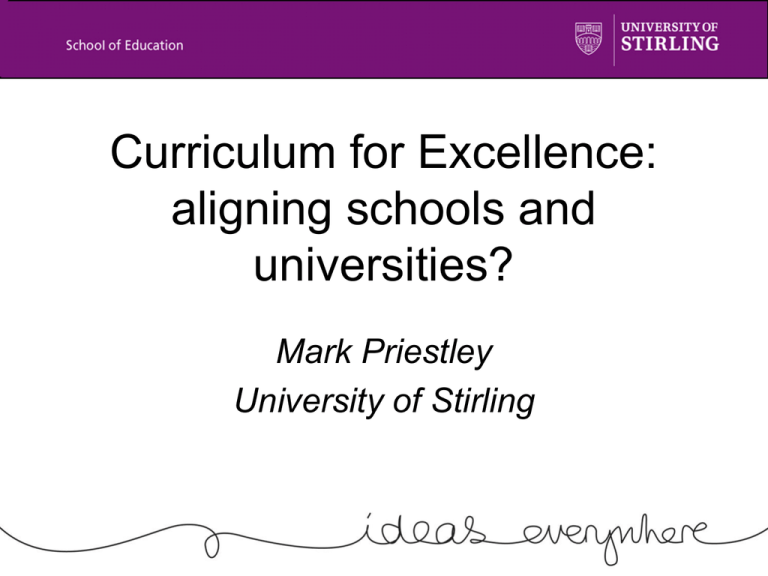
Curriculum for Excellence:
aligning schools and
universities?
Mark Priestley
University of Stirling
A fair assumption?
According to a recent Universities Scotland report:
“The approaches to learning and teaching and the skills
emphasised in CfE are, in many respects, bringing
schools in line with those already in place or being
developed within universities, and this may signal
opportunities to extend collaborative activity.” (p.13)
Questions
• Does CfE articulate well with current practices in
university:
– In terms of the CfE policy intentions?
– In terms of developing practices in schools?
– In terms of university practices?
Graduate attributes
Academic excellence
•
•
•
•
•
Critical thinking and effective communication
In-depth and extensive knowledge, understanding and skills at
internationally-recognised levels in their chosen discipline(s);
A breadth of knowledge, understanding and skills beyond their
chosen discipline(s);
An ability to participate in the creation of new knowledge and
understanding through research and inquiry;
A contextual understanding of past and present knowledge
and ideas;
An intellectual curiosity and a willingness to question accepted
wisdom and to be open to new ideas
Learning and personal development
•
•
•
•
•
•
•
•
•
A capacity for independent, conceptual and creative thinking;
A capacity for problem identification, the collection of
evidence, synthesis and dispassionate analysis;
A capacity for attentive exchange, informed argument and
reasoning;
An ability to communicate effectively for different purposes
and in different contexts;
An ability to work independently and as part of a team;
A diverse set of transferable and generic skills
Active citizenship
An openness to, and an interest in, life-long learning through
directed and self-directed study;
An awareness of personal strengths and weaknesses,
A capacity for self reflection, self discovery and personal
development
•
•
•
•
•
An awareness and appreciation of ethical and moral issues;
An awareness and appreciation of social and cultural
diversity;
An understanding of social and civic responsibilities, and of
the rights of individuals and groups;
An appreciation of the concepts of enterprise and leadership
in all aspects of life;
A readiness for citizenship in an inclusive society
Source – University of Aberdeen (http://www.abdn.ac.uk/graduateattributes)
CfE’s Four Capacities
Policy constructs in CfE
• Active learning
– ‘New’ practices: cooperative learning; formative assessment;
practicals; fieldwork; enquiry-based learning
• Interdisciplinary learning
– Hybrid subjects; rich tasks; cross-curricular themes; the BGE
• Focus on skills/competencies
– Literacy; numeracy; ICT; political literacy
• Independent learning
– ‘Responsibility for own learning’; pupil questioning; enquiry;
metacognition
So far, so good….
[Re]contextualisation
• Successive [re]interpretation of policy has led to
mutations and confusion within CfE
HMIe
‘guidance’
2007-10
2004
A CfE
BTC
series
LA
‘guidance’
School
practices
BTC
summaries
e.g. assessment
2007 – E&Os not assessment standards
2010 – BTC 5; local authority levels within levels
Tensions within the CfE model
CfE as a process curriculum
• Making sense of big ideas
• Developing ‘fit for purpose’
practices:
– Powerful knowledge
– Powerful pedagogies
CfE as an outcomes
curriculum
• Auditing existing practice
against outcomes
– Tweaking
– Tick-box approaches
– Incremental/piecemeal
change
‘Amnesia and déjà vu’ (Priestley and Humes, 2010)
Teacher agency
“Within a clear framework of national expectations,
teachers will have greater scope and space for
professional decisions about what and how they should
teach, enabling them to plan creatively within broader
parameters”.
(Scottish Executive Education Department, 2006)
• Teachers expected to be agents of change
• Big push to raise teacher capacity
– Donaldson review
– Teaching as a Master’s profession
– New GTCS teaching standards – professional enquiry
• But can teachers be agentic in curriculum
development?
What is agency?
• Agency: the ability to direct one’s actions (and be
responsible for them)
– Decision and judgement
– Manoeuvre between repertoires
– The ability to do otherwise
• An ecological view of agency
– Not something people can have, but something that people
can do;
– Outcome of the interaction of individual and social/material
environment
•
The question is therefore:
– Not: What is an agentic individual?
– But: How is agency achieved?
Teacher agency model
(Priestley, Biesta and Robinson, 2013)
A balancing act?
(Leat, Livingston and Priestley, 2013)
Input regulation in Scotland
• Policy seems to reduce input regulation.
• But
– National guidance helps frame discourses around education
• Continued framing of curriculum around old domains of knowledge
• Teachers adopt the technical language of policy
– Variation between local authorities
• Hierarchical nature of Scottish education – “You just do a good job.
You try your best. You do not muck around. You do not do things
you should not do or challenge superiors in a way unless it’s
obviously something genuine”.
• Mandatory teaching materials and procedures in many authorities
• Macro level policy reduces input regulation, but systemic
features maintain it in many cases
Output regulation (1)
• Statistical use of attainment data
– Standard Tables and Charts (STACS)
• Comparison of teachers across secondary schools
– Assessment of performance against curriculum outcomes
• Comparison of primary schools
– Comparator league tables
• Comparison of ‘similar’ schools
• Mission creep in assessment – Curriculum for Audit?
– Recent guidance on reducing bureaucracy
– New benchmarking tool planned.
• But will it make a difference?
Bureaucracy
“Living thru the paperwork
nightmare that is
strangling good CFE
learning n teaching! You
want 2 see N4/5 assesm”
(Twitter, November 2013)
Output regulation (2)
• External inspections
– School inspections – HMIe
• Revamped in 2006-7, but ‘cosmetic, since the basic instruments
and methodology remain the same’ (Reeves, 2008)
• Further changes recently – greater focus on self-evaluation
• But continue to be high-stakes events associated with performativity
– Local authority audits
• Shift since late 1990s from a supportive advisory role to a quality
improvement role
• Mirrors inspection processes
• High emphasis on accountability and evidence
The balance between input and
output regulation
(Leat, Livingston and Priestley, 2013)
Implications for teacher agency
• Over-emphasis in policy on the role of the individual
teachers:
– Through extending teacher autonomy
• Raising capacity through CPD
• Exhorting teachers to be agents of change
• A continued focus on output regulation acts against such
aspirations
–
–
–
–
a set of social structures (systems, power relations, roles, etc.)
cultural expectations about what is possible
a practical issue (what is actually possible)
and an evaluative issue (how professionals judge aspects such
as risk)
In practice
• Most Scottish schools are improving in response to CfE.
• But, output regulation potentially impacts radically on the
possibilities for agency
– by enabling or precluding particular practices
– undermining professionals’ ability to take responsibility for their
work
• Implications for CfE
– Many new practices adopted to tick the box rather than for
curricular purposes
– Change tends to be incremental and piecemeal
– Teachers struggle to achieve agency
Losing sight of the big ideas
• Purposes of CfE trumped by more instrumental
imperatives:
– Inspections
– League tables
– University entrance
• The result:
– Performative cultures (playing the game, teaching to the test,
fabrication) (see Keddie, 2013)
– Students ill-equipped for the worlds of work, university and for
democratic citizenship
Tension between the old and
the new
And the universities?
• Implications for:
– Admissions:
• “University leaders affirm that they continue to be committed to
fair admissions policies and that these will allow equal
consideration of candidates who possess the necessary
knowledge and skills base irrespective of what routes they may
have taken through the Senior Phase.” (p9)
– Pedagogy
•
•
•
•
Dialogical/enquiry-based learning (seminars)
The traditional lecture. ‘Listen again’?
E-learning
Teaching skills
– Assessment
• Variety
• Continuous assessment
• Formative assessment
Articulation between school and
university
• If CfE develops as intended:
– “The approaches to learning and teaching and the skills
emphasised in CfE … [will] … bring schools in line with …..
universities”
• But
– Still considerable progress to make
– Some of this needs to come from the university sector
References
Leat, D., Livingston, K. & Priestley, M. (2013). Curriculum deregulation in
England and Scotland - Different directions of travel? In W.Kuiper & J.
Berkvens (Eds.), Balancing Curriculum Regulation and Freedom across
Europe, CIDREE Yearbook 2013. Enschede, the Netherlands: SLO
Keddie, A. (2013). Thriving amid the demands of the contemporary audit
culture: a matter of school context. Journal of Education Policy, 28{6}, 75766
Priestley, M., Biesta, G.J.J. & Robinson, S. (2013). Teachers as agents of
change: teacher agency and emerging models of curriculum. In M.
Priestley & G.J.J. Biesta (Eds.), Reinventing the curriculum: new trends in
curriculum policy and practice, London: Bloomsbury.
Priestley, M. & Humes, W. (2010). The Development of Scotland's
Curriculum for Excellence: amnesia and déjà vu. Oxford Review of
Education, 36[3], 345-361.
